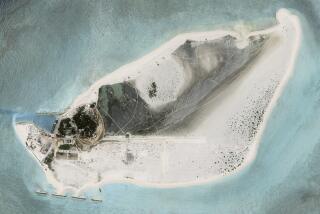U.S. Team Checks on Serviceability of Airstrip in N. Iraq
- Share via
SULAYMANIYAH, Iraq — A U.S. intelligence team Wednesday visited an abandoned airstrip here that is undergoing repairs for possible use in an invasion of Iraq.
The Americans have been traveling throughout this Kurdish enclave in recent months, scouting potential sites for U.S. troop deployments and tracking the activities of a militant Islamic group. The inspection of the 2-mile-long landing strip, which stretches along the mountains outside this city, offered another brief glimpse of the intelligence teams traveling in sport utility vehicles with tinted windows.
“We have to be finished tomorrow,” said Sheik Noori, whose construction crew was digging bunkers on both sides of the runway, which is long enough to handle C-130 troop transports and other military aircraft. “After we’re done cleaning it, they will paint it and bring in lights. They’ll also have to put a strip of new asphalt on it.”
The landing strip -- known to locals as Bakrajo airport -- was built in the 1980s during Iraq’s war with Iran. It was rarely used, and sits amid farm and sheep-grazing land near neighborhoods of cinderblock homes housing thousands of refugees. Sections of the strip are cracked and gouged. Construction crews have been working into the night to repair it.
“Over the past three days, Kurdish security has set up camps, and trucks and equipment have been coming day and night,” said Omar Ahmed, a watchman at a local natural gas distributor. “Sometimes they work until 9 p.m.”
Repair work is also expected to begin on a heliport near here for use in a possible war.
Northern Iraq is an autonomous enclave for 3.5 million Kurds who are protected from Iraq’s army by a “no-fly” zone patrolled by American and British warplanes. The region, which borders Turkey, Syria and Iran, would be key for an invasion that would move south toward Baghdad.
Access to northern Iraq would enable U.S. forces to apprehend escaping Iraqi soldiers and secure the strategic oil cities of Mosul and Kirkuk.
The U.S. team here was accompanied by Bavel Talabani, whose father, Jalal, is president of the Patriotic Union of Kurdistan, which controls the eastern portion of northern Iraq. The younger Talabani is the PUK’s liaison with U.S. military and intelligence teams.
The intelligence teams have also been spotted in recent weeks in the mountains near the Iranian border. They have been monitoring the bunkers and movements of Ansar al-Islam, a group of 400 to 700 mostly Kurdish Muslim militants battling PUK forces for control of a string of villages in the north. Some of the extremists trained at Al Qaeda camps in Afghanistan.
More to Read
Sign up for Essential California
The most important California stories and recommendations in your inbox every morning.
You may occasionally receive promotional content from the Los Angeles Times.











